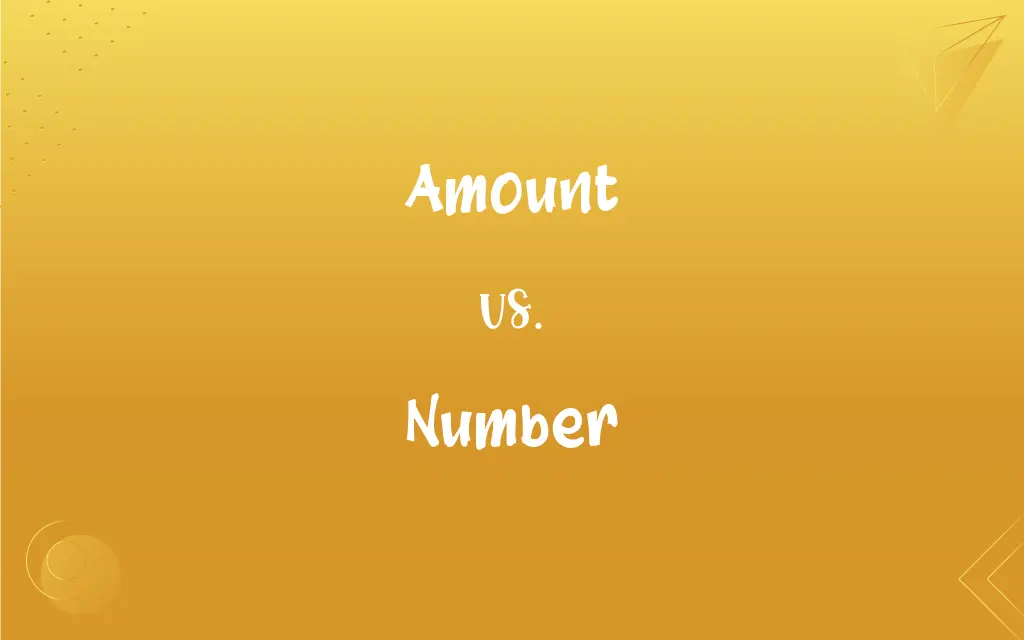Amount vs. Number: What's the Difference?
Edited by Aimie Carlson || By Harlon Moss || Published on November 27, 2023
"Amount" refers to a quantity of something uncountable; "number" refers to a count of individual items.

Key Differences
"Amount" and "number" are two terms used in the English language to refer to the quantity of things. "Amount" typically addresses the total of uncountable nouns, while "number" pertains to the count of individual, countable items.
When discussing substances or things that can't be counted individually, like water or sand, we use the term "amount". On the other hand, "number" is suitable for things that are countable, such as apples or cars.
Consider the sentence, "The amount of water in the jug is insufficient." Here, "amount" refers to the volume or quantity of water. Compare this to, "The number of apples in the basket is ten," where "number" gives a specific count of apples.
Using "amount" or "number" incorrectly can lead to grammatical errors. Saying, "The number of sugar" is incorrect because sugar, being uncountable, requires "amount". Similarly, "The amount of students" is wrong as students are countable and should be referred to by "number".
To sum up, "amount" deals with uncountable quantities and "number" is used for countable items. Both terms emphasize quantity, but their usage depends on the type of noun they're associated with.
ADVERTISEMENT
Comparison Chart
Type of Noun
Uncountable
Countable
Example Noun
Sugar, water, information
Apples, cars, students
Grammar Usage
Amount of [uncountable noun]
Number of [countable noun]
Measurement
Refers to volume, magnitude, or degree
Refers to a specific count
Sentence Structure Example
"The amount of rain was excessive."
"The number of rainy days was high."
ADVERTISEMENT
Amount and Number Definitions
Amount
The degree or extent of something.
The amount of effort he put into the project was commendable.
Number
A distinct issue or edition.
The latest number of the magazine is out.
Amount
The total of two or more quantities.
The amount of money raised was astonishing.
Number
A count of individual items.
The number of candies in the jar is 100.
Amount
A quantity of uncountable items.
The amount of salt in the dish was perfect.
Number
A mathematical symbol representing a quantity.
The number 7 is considered lucky in many cultures.
Amount
A principal plus its interest.
The total amount due on the loan is $5,000.
Number
A song, dance, or other performance.
She performed a number from a popular musical.
Amount
The sum total of effects.
His contributions amount to very little in the grand scheme.
Number
Something that arouses strong emotions.
That speech was quite a number on everyone.
Amount
The total of two or more quantities; the aggregate.
Number
A member of the set of positive integers; one of a series of symbols of unique meaning in a fixed order that can be derived by counting.
Amount
A number; a sum.
Number
A member of any of the following sets of mathematical objects
Integers, rational numbers, real numbers, and complex numbers. These sets can be derived from the positive integers through various algebraic and analytic constructions.
FAQs
When should I use "amount"?
Use "amount" when referring to uncountable nouns, like water or sugar.
Can "amount" refer to money?
Yes, you can use "amount" to refer to a sum of money, e.g., "The amount owed is $50."
When should I use "number"?
Use "number" when referring to countable nouns, such as apples or students.
Is it correct to say "number of information"?
No, "information" is uncountable, so you should use "amount of information."
Can "number" refer to a position in a sequence?
Yes, e.g., "She's number one in the competition."
Can "amount" indicate degree or extent?
Yes, e.g., "The amount of his knowledge on the subject is vast."
Is "number" used for editions or issues?
Yes, e.g., "The latest number of the journal was enlightening."
Can "number" be singular and plural?
Yes, e.g., "The number of apples is ten" vs. "There are a number of reasons."
How is "amount" used in finance?
"Amount" can refer to a principal plus its interest, e.g., "The amount due is significant."
Can "amount" refer to volume?
Yes, e.g., "The amount of water in the tank is 50 liters."
Does "number" always indicate a specific count?
Usually, but it can be used more generally, e.g., "A number of people agree."
Is "amount" used in measurements?
Yes, it often refers to volume, magnitude, or degree.
How can "number" be used in entertainment?
"Number" can refer to a song, dance, or performance, e.g., "She danced a lively number."
Is it correct to say "amount of people"?
No, since people are countable, you should use "number of people."
Can "number" be used in mathematics?
Yes, "number" refers to a mathematical symbol representing quantity.
Can "amount" relate to total effects?
Yes, e.g., "His deeds amount to nothing."
Is "amount" singular or plural?
"Amount" is singular but refers to a collective quantity.
Can "number" evoke emotions?
In a figurative sense, yes. E.g., "That story was a real number on my heart."
Is "number" always about counting?
Mostly, but not always. It can also refer to a musical performance or a distinct issue of a publication.
Can "amount" and "number" be used interchangeably?
No, their usage depends on whether the noun is countable or uncountable.
About Author
Written by
Harlon MossHarlon is a seasoned quality moderator and accomplished content writer for Difference Wiki. An alumnus of the prestigious University of California, he earned his degree in Computer Science. Leveraging his academic background, Harlon brings a meticulous and informed perspective to his work, ensuring content accuracy and excellence.
Edited by
Aimie CarlsonAimie Carlson, holding a master's degree in English literature, is a fervent English language enthusiast. She lends her writing talents to Difference Wiki, a prominent website that specializes in comparisons, offering readers insightful analyses that both captivate and inform.







































































